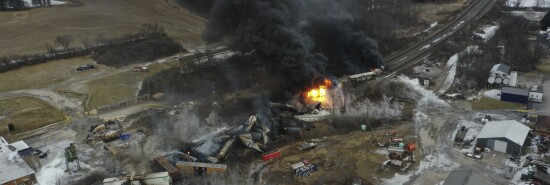
After East Palestine disaster, let’s reconsider how we transport hazardous materials
Christopher Barnard
Video Embed
The disastrous train derailment in Ohio last month, followed by another derailment from the same company just last week, has brought attention to the impact of pollution on underserved communities. While access to clean air and clean water is a fundamental right, the people of Ohio have been let down, and the Biden administration and the legacy media largely ignored their plight, at least at first.
The whole affair has rightfully brought into question the safety of our communities, in particular regarding the transportation of hazardous materials. The derailment in East Palestine showed the real public health costs associated with these kinds of accidents.
To prevent an explosion, officials decided to burn off the chemicals on the train — which included five tankers of vinyl chloride, a hazardous and odorless chemical used in items such as packaging and PVC water pipes — and the governor called for immediate evacuation. The threat was clear: “grave danger of death … a high risk of severe injury, including skin burns and serious lung damage.”
It’s hard to believe that the surroundings are truly safe just a few weeks later. Out of sight, out of mind isn’t a particularly good public safety policy.
In Houston, for example, experts recently tested soils near railroads and found that every single sample contained toxic chemical compounds associated with cancer and other health risks. In East Palestine, the vinyl chloride didn’t magically disappear when it was burned; it dissolved into the soil, groundwater, and wildlife habitat.
While there were no immediate deaths, we lack data on the future effects of the vinyl chloride that was absorbed into East Palestine’s surroundings. Pollution is a silent and often invisible killer, hitting our most vulnerable communities hardest.
Sympathetic words and rhetorical flair won’t salvage the situation. It’s time to seriously examine the costs and benefits of moving hazardous materials by train rather than by other means, such as pipelines. Each year, there are over 1,000 train derailments in the United States. That’s 1,000 potential East Palestines. The more we transport hazardous materials, the more careful we have to be to avoid incidents similar to the Ohio derailment, or worse.
Consider, for example, the pending merger between Canadian Pacific and Kansas City Southern, two major railroad companies. This would drastically increase the number of trains carrying hazardous materials by making the conglomerate the only railroad stretching all the way from Canada to Mexico.
While there are certainly benefits to this, the situation in Ohio compels us to consider the risks as well. The project’s final Environmental Impact Statement estimates the merger itself will result in a 20.16% increase in hazmat transportation, or nearly two million new hazardous carloads by 2027.
For a city such as Chicago, a major population center through which one in four trains in the U.S. passes, this is of real concern. 2019 already saw 9.95 million tons of hazardous material moved through Illinois. Elsewhere, such as Minnesota, an additional 15-20 trains per month will be carrying oil from Canada. Derailment of any of these would be catastrophic, but it’s a scenario that could potentially be avoided with greater pipeline access.
Ultimately, we need to put communities first. While train companies have taken initial steps to increase safety post-derailment, we should carefully examine how we operate train loads. There should be detailed disclosures regarding the chemicals being shipped through the country. Residents who live near tracks deserve more transparency. The Biden administration should thoroughly research this matter before the Canadian Pacific-Kansas City Southern merger is approved.
The train that derailed in East Palestine started its trek in Madison, Wisconsin, and went through Illinois. If it had derailed any sooner, perhaps in a major city, this could have been an even bigger human disaster. And next time, without a more thoughtful approach, it very well might be. We owe it to America’s communities to do better.
CLICK HERE TO READ MORE FROM THE WASHINGTON EXAMINER
Christopher Barnard (@ChrisBarnardDL) is the vice president of external affairs at the American Conservation Coalition.
